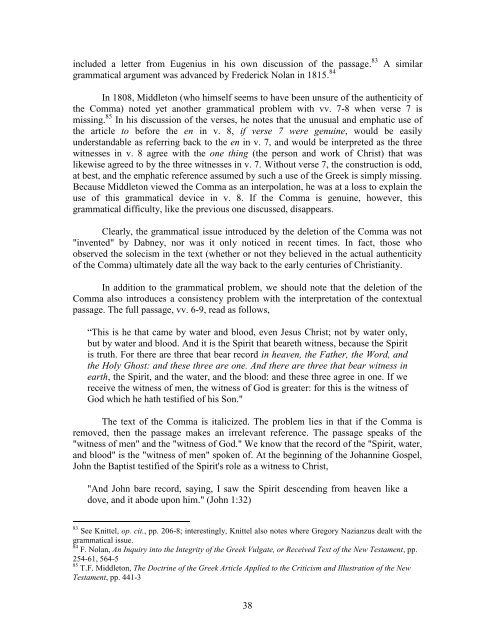A Defense of the Johannine Comma - Study to Answer.Net
A Defense of the Johannine Comma - Study to Answer.Net
A Defense of the Johannine Comma - Study to Answer.Net
You also want an ePaper? Increase the reach of your titles
YUMPU automatically turns print PDFs into web optimized ePapers that Google loves.
included a letter from Eugenius in his own discussion <strong>of</strong> <strong>the</strong> passage. 83 A similar<br />
grammatical argument was advanced by Frederick Nolan in 1815. 84<br />
In 1808, Middle<strong>to</strong>n (who himself seems <strong>to</strong> have been unsure <strong>of</strong> <strong>the</strong> au<strong>the</strong>nticity <strong>of</strong><br />
<strong>the</strong> <strong>Comma</strong>) noted yet ano<strong>the</strong>r grammatical problem with vv. 7-8 when verse 7 is<br />
missing. 85 In his discussion <strong>of</strong> <strong>the</strong> verses, he notes that <strong>the</strong> unusual and emphatic use <strong>of</strong><br />
<strong>the</strong> article <strong>to</strong> before <strong>the</strong> en in v. 8, if verse 7 were genuine, would be easily<br />
understandable as referring back <strong>to</strong> <strong>the</strong> en in v. 7, and would be interpreted as <strong>the</strong> three<br />
witnesses in v. 8 agree with <strong>the</strong> one thing (<strong>the</strong> person and work <strong>of</strong> Christ) that was<br />
likewise agreed <strong>to</strong> by <strong>the</strong> three witnesses in v. 7. Without verse 7, <strong>the</strong> construction is odd,<br />
at best, and <strong>the</strong> emphatic reference assumed by such a use <strong>of</strong> <strong>the</strong> Greek is simply missing.<br />
Because Middle<strong>to</strong>n viewed <strong>the</strong> <strong>Comma</strong> as an interpolation, he was at a loss <strong>to</strong> explain <strong>the</strong><br />
use <strong>of</strong> this grammatical device in v. 8. If <strong>the</strong> <strong>Comma</strong> is genuine, however, this<br />
grammatical difficulty, like <strong>the</strong> previous one discussed, disappears.<br />
Clearly, <strong>the</strong> grammatical issue introduced by <strong>the</strong> deletion <strong>of</strong> <strong>the</strong> <strong>Comma</strong> was not<br />
"invented" by Dabney, nor was it only noticed in recent times. In fact, those who<br />
observed <strong>the</strong> solecism in <strong>the</strong> text (whe<strong>the</strong>r or not <strong>the</strong>y believed in <strong>the</strong> actual au<strong>the</strong>nticity<br />
<strong>of</strong> <strong>the</strong> <strong>Comma</strong>) ultimately date all <strong>the</strong> way back <strong>to</strong> <strong>the</strong> early centuries <strong>of</strong> Christianity.<br />
In addition <strong>to</strong> <strong>the</strong> grammatical problem, we should note that <strong>the</strong> deletion <strong>of</strong> <strong>the</strong><br />
<strong>Comma</strong> also introduces a consistency problem with <strong>the</strong> interpretation <strong>of</strong> <strong>the</strong> contextual<br />
passage. The full passage, vv. 6-9, read as follows,<br />
“This is he that came by water and blood, even Jesus Christ; not by water only,<br />
but by water and blood. And it is <strong>the</strong> Spirit that beareth witness, because <strong>the</strong> Spirit<br />
is truth. For <strong>the</strong>re are three that bear record in heaven, <strong>the</strong> Fa<strong>the</strong>r, <strong>the</strong> Word, and<br />
<strong>the</strong> Holy Ghost: and <strong>the</strong>se three are one. And <strong>the</strong>re are three that bear witness in<br />
earth, <strong>the</strong> Spirit, and <strong>the</strong> water, and <strong>the</strong> blood: and <strong>the</strong>se three agree in one. If we<br />
receive <strong>the</strong> witness <strong>of</strong> men, <strong>the</strong> witness <strong>of</strong> God is greater: for this is <strong>the</strong> witness <strong>of</strong><br />
God which he hath testified <strong>of</strong> his Son."<br />
The text <strong>of</strong> <strong>the</strong> <strong>Comma</strong> is italicized. The problem lies in that if <strong>the</strong> <strong>Comma</strong> is<br />
removed, <strong>the</strong>n <strong>the</strong> passage makes an irrelevant reference. The passage speaks <strong>of</strong> <strong>the</strong><br />
"witness <strong>of</strong> men" and <strong>the</strong> "witness <strong>of</strong> God." We know that <strong>the</strong> record <strong>of</strong> <strong>the</strong> "Spirit, water,<br />
and blood" is <strong>the</strong> "witness <strong>of</strong> men" spoken <strong>of</strong>. At <strong>the</strong> beginning <strong>of</strong> <strong>the</strong> <strong>Johannine</strong> Gospel,<br />
John <strong>the</strong> Baptist testified <strong>of</strong> <strong>the</strong> Spirit's role as a witness <strong>to</strong> Christ,<br />
"And John bare record, saying, I saw <strong>the</strong> Spirit descending from heaven like a<br />
dove, and it abode upon him." (John 1:32)<br />
83<br />
See Knittel, op. cit., pp. 206-8; interestingly, Knittel also notes where Gregory Nazianzus dealt with <strong>the</strong><br />
grammatical issue.<br />
84<br />
F. Nolan, An Inquiry in<strong>to</strong> <strong>the</strong> Integrity <strong>of</strong> <strong>the</strong> Greek Vulgate, or Received Text <strong>of</strong> <strong>the</strong> New Testament, pp.<br />
254-61, 564-5<br />
85<br />
T.F. Middle<strong>to</strong>n, The Doctrine <strong>of</strong> <strong>the</strong> Greek Article Applied <strong>to</strong> <strong>the</strong> Criticism and Illustration <strong>of</strong> <strong>the</strong> New<br />
Testament, pp. 441-3<br />
38


